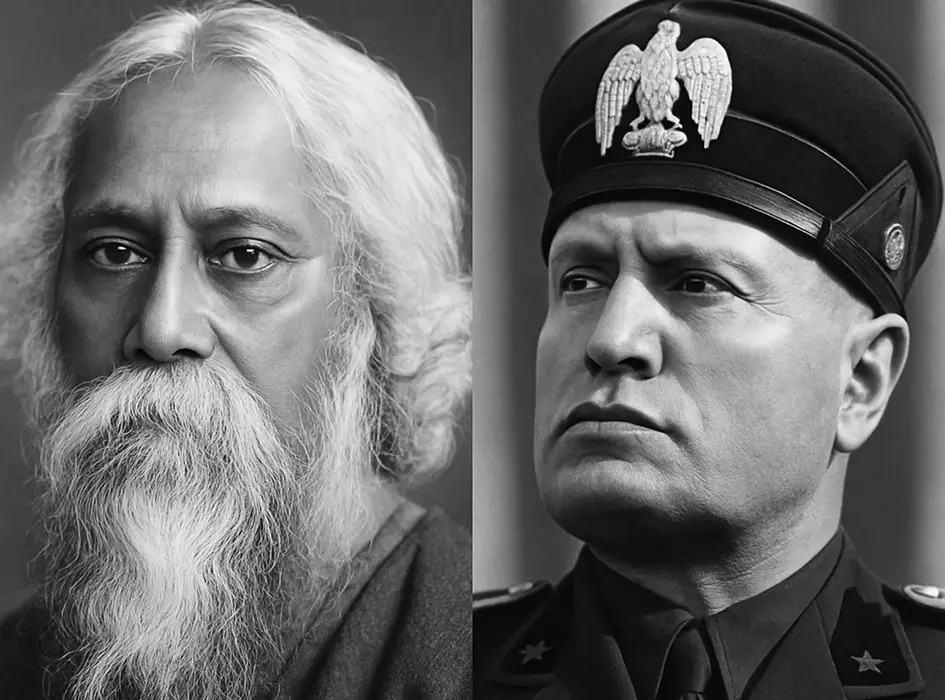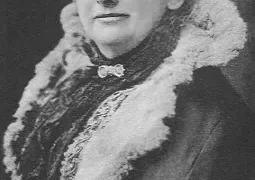In the summer of 1926, an unlikely meeting took place in Rome between two towering figures of their time: Rabindranath Tagore, the Bengali poet, philosopher, and Nobel laureate, and Benito Mussolini, the fascist dictator of Italy. This encounter, brief yet symbolically charged, offers a fascinating lens through which to explore the complex interplay of global intellectualism, cultural exchange, and the uneasy alliances forged in a world teetering on the edge of political upheaval. The meeting between Tagore and Mussolini was not merely a personal interaction but a collision of ideals, ideologies, and aspirations, reflecting the broader tensions of the interwar period. This essay delves into the historical context, the motivations behind their meeting, the implications of their encounter, and the broader phenomenon of intellectuals navigating the treacherous waters of political power in the early 20th century.
Historical Context: A World in Flux
The 1920s were a time of profound global transformation. The aftermath of World War I had reshaped political boundaries, destabilized economies, and given rise to new ideological currents. In Europe, the rise of authoritarian regimes, including Mussolini’s fascist government in Italy, marked a sharp departure from liberal democratic ideals. Mussolini, who had seized power in 1922 through the March on Rome, was consolidating his regime by promoting a vision of national rejuvenation, militarism, and centralized control. His propaganda machine portrayed him as a charismatic leader, a modern Caesar restoring Italy’s glory, which attracted both domestic support and international curiosity.

Meanwhile, in Asia, the colonial world was stirring with anti-imperialist movements. In India, the struggle for independence from British rule was gaining momentum, with figures like Mahatma Gandhi and Jawaharlal Nehru advocating for self-rule. Rabindranath Tagore, already a global literary icon after winning the Nobel Prize in Literature in 1913 for Gitanjali, was a leading voice in this cultural and intellectual awakening. Tagore’s philosophy, rooted in humanism, universalism, and a synthesis of Eastern and Western thought, positioned him as a global ambassador for Indian culture. His establishment of Visva-Bharati University in Santiniketan was a testament to his vision of a world united through education, art, and mutual understanding.
The meeting between Tagore and Mussolini occurred against this backdrop of ideological polarization. Tagore was touring Europe in 1926 to promote his ideas, raise funds for Visva-Bharati, and engage with intellectuals. Mussolini, eager to project Italy’s influence on the global stage, saw value in hosting prominent international figures to bolster his regime’s legitimacy. The encounter was thus a convergence of two very different agendas: Tagore’s pursuit of universalist ideals and Mussolini’s calculated use of cultural diplomacy.
The Meeting: A Study in Contrasts
The exact details of Tagore’s meeting with Mussolini are sparse, but accounts from Tagore’s letters and contemporary reports provide insight into the event. Tagore arrived in Italy in May 1926, invited by Carlo Formichi, an Italian Indologist who admired Tagore’s work and facilitated his visit. Mussolini, aware of Tagore’s international stature, granted him an audience at the Palazzo Venezia. The meeting was brief, lasting less than an hour, but it was laden with symbolic weight.
Tagore, a poet-philosopher who championed individual freedom and cultural unity, was an unlikely guest of a dictator who glorified state control and suppressed dissent. According to Tagore’s own reflections, he was initially impressed by Mussolini’s charisma and the apparent orderliness of fascist Italy. In a letter to his friend C.F. Andrews, Tagore wrote of Italy’s “new energy” and the “discipline” he observed, suggesting a momentary fascination with the efficiency of Mussolini’s regime. This initial impression, however, must be understood in the context of Tagore’s limited exposure to the realities of fascist governance during his brief visit.
Mussolini, for his part, saw the meeting as an opportunity to enhance his image as a patron of culture. By hosting Tagore, he could project an aura of intellectual sophistication and align himself with a globally respected figure. The fascist regime’s propaganda machine ensured that the meeting was publicized, with Italian newspapers portraying it as evidence of Mussolini’s international influence. Tagore was feted with public receptions, lectures, and tours, all carefully orchestrated to showcase Italy’s modernity under fascist rule.
Yet the meeting was not without tension. Tagore, a staunch critic of imperialism and authoritarianism, soon grew uneasy about the fascist regime’s methods. His interactions with Italian intellectuals, including those opposed to Mussolini, and his own observations of the regime’s militaristic displays led him to question the cost of Italy’s “order.” In subsequent writings and interviews, Tagore expressed disillusionment, describing fascism as a “violent creed” that suppressed individual liberty. This shift in perspective highlights the awkwardness of the alliance: Tagore’s universalist ideals were fundamentally at odds with Mussolini’s authoritarian vision.
Intellectuals and Power: A Broader Phenomenon
The Tagore-Mussolini encounter is emblematic of a broader phenomenon in the interwar period: the complex relationship between global intellectuals and political power. Intellectuals like Tagore, who sought to bridge cultures and promote universal values, often found themselves navigating a world where power was increasingly concentrated in the hands of authoritarian leaders. This dynamic led to a series of awkward alliances, as thinkers grappled with the temptation to engage with regimes that offered resources, platforms, or apparent stability.
Tagore was not alone in this predicament. Other intellectuals of the era, such as George Bernard Shaw and H.G. Wells, also expressed qualified admiration for Mussolini’s or Stalin’s regimes, drawn to their promises of social order or progress. Shaw, for instance, praised Mussolini’s ability to “get things done,” while Wells saw in authoritarian systems a potential antidote to the chaos of liberal democracies. These views often stemmed from a combination of idealism, naivety, and selective exposure to the realities of these regimes.
For Tagore, the allure of Mussolini’s Italy was fleeting and superficial. His initial impressions were shaped by the curated image of fascist efficiency, but his deeper commitment to humanism led him to reject fascism unequivocally. In a 1926 interview with The Manchester Guardian, Tagore warned against the dangers of sacrificing freedom for order, stating, “The nation is a machine, and the individual is crushed under it.” This critique reflects his broader philosophy, which emphasized the primacy of the human spirit over mechanistic systems of control.
The Tagore-Mussolini meeting also underscores the challenges of cultural diplomacy in a polarized world. Tagore’s visit was partly motivated by his desire to secure support for Visva-Bharati, which required international funding and recognition. Engaging with figures like Mussolini, however distasteful, was sometimes a pragmatic necessity for intellectuals seeking to advance their causes. Yet such engagements carried risks, as they could be co-opted by regimes to legitimize their rule. Tagore’s experience serves as a cautionary tale about the perils of aligning, even briefly, with authoritarian power.
Implications and Legacy
The meeting between Tagore and Mussolini had limited immediate impact but carried significant symbolic weight. For Mussolini, it was a propaganda victory, a chance to burnish his regime’s credentials by associating with a Nobel laureate. For Tagore, it was a moment of misjudgment, followed by a reaffirmation of his commitment to freedom and humanism. The episode did not derail Tagore’s global influence, but it highlighted the complexities of his role as a public intellectual in a world of competing ideologies.
In India, Tagore’s brief flirtation with fascist Italy was met with criticism from some quarters. Indian nationalists, particularly those aligned with Gandhi’s non-violent movement, viewed Tagore’s initial praise for Mussolini with skepticism. However, Tagore’s subsequent disavowal of fascism mitigated this backlash, and his broader contributions to Indian culture and anti-colonial thought remained unchallenged.
Globally, the encounter serves as a case study in the fraught relationship between intellectuals and power. It illustrates how even the most principled thinkers can be momentarily swayed by the allure of order or charisma, only to recoil when confronted with the underlying realities of authoritarianism. Tagore’s experience also highlights the importance of critical reflection and the courage to revise one’s views in light of new evidence.
The Tagore-Mussolini meeting resonates with contemporary debates about the role of intellectuals in engaging with controversial political figures. In an era of rising populism and authoritarianism, the question of whether to dialogue with or legitimize such leaders remains pertinent. Tagore’s journey—from initial curiosity to principled rejection—offers a model for navigating these dilemmas with integrity.
Conclusion: When Tagore Met Mussolini
The meeting between Rabindranath Tagore and Benito Mussolini in 1926 was a fleeting yet revealing moment in the history of global intellectualism. It brought together two figures whose worldviews were fundamentally incompatible: a poet-philosopher dedicated to universal human values and a dictator committed to authoritarian control. Their encounter, set against the backdrop of a world in flux, underscores the complexities of cultural exchange, the seductive appeal of power, and the challenges of maintaining moral clarity in turbulent times.
Tagore’s brief fascination with Mussolini’s Italy, followed by his unequivocal rejection of fascism, reflects the broader struggles of intellectuals in the interwar period to reconcile idealism with pragmatism. The episode serves as a reminder of the risks inherent in engaging with authoritarian regimes, even for noble purposes. It also highlights the enduring relevance of Tagore’s humanism, which rejected the dehumanizing forces of nationalism and militarism in favor of a vision of global unity.
Ultimately, the Tagore-Mussolini encounter is a story of awkward alliances and hard-won clarity. It reminds us that the pursuit of universal ideals requires vigilance, humility, and a willingness to confront uncomfortable truths. In a world still grappling with the tensions between freedom and order, Tagore’s journey offers timeless lessons for intellectuals and citizens alike.







